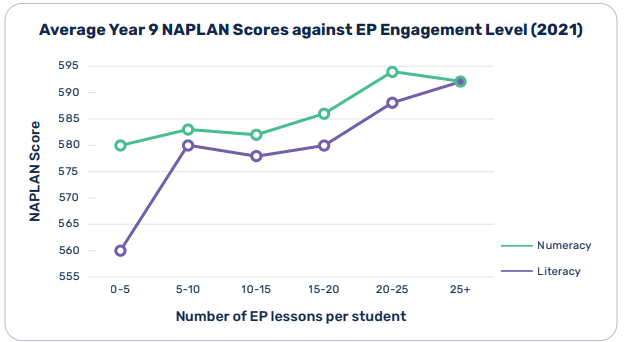
In October, the NAPLAN National Report 2022 revealed that the literacy outcomes of Australian students have remained mostly stable for a second year in a row, defying predictions of drastic falls due to the Covid-19 pandemic.
ACARA CEO, David de Carvalho, said that over the long term, writing results – which, as recently reported, had been in decline up to 2018 – are turning around, showing an upward trend for Years 5, 7 and 9 since 2019.
“This suggests that the efforts being made by schools and teachers, in response to those earlier warning signs, are paying off,” de Carvalho, said.
To help sustain their strong NAPLAN outcomes, many schools are working with education service providers, whose data insights and analytics are helping teachers identify, and close, gaps in students’ learning.
Read more: The role of ‘humanised technology’ in reversing Australia’s literacy slump
One service provider helping schools improve their NAPLAN results is Education Perfect (EP), which works with over 3,000 schools globally to provide educators with the time, insights, and resources they need to support every learner in achieving their full potential.
In Australia, more than 1,000 schools are using EP’s comprehensive and curriculum-aligned English and mathematics lessons with Year 7-9 students – and with encouraging results.
Comparative analysis of the use of EP alongside NAPLAN standardised assessment results between 2019 and 2021 provided strong evidence that the more that schools use EP, the better the NAPLAN results, and that schools using EP see greater learning growth from Year 7 to Year 9.
According to the analysis, EP schools are shown to score 1.5%-3.8% higher than schools who do not use EP, while highly engaged EP schools score 4.4%-6.7% higher than those that don’t use the program.

'An engaging, adaptive and effective experience'
Kalvin Fernandez, English Teacher and Assistant Boarding Housemaster at The King’s School in Sydney, said Education Perfect has been a highly effective tool for preparing students for assessment tasks, NAPLAN, Minimum Standards, and the HSC.
“The features and resources are terrific, and I can easily set my students homework to complete. The automatic revision feature is amazing, and I absolutely love how it recommends extra practice for my students.”
Education Perfect CEO, Alex Burke, said EP uses learning design drawn from evidence-based research into best practice to save teachers time and create a user experience that is engaging, adaptive, and effective.
"Our research has clearly shown that linking our lessons and learning experience to concepts such as Rosenshine’s Principles of Instruction and Black and Wiliam’s research into Assessment for Learning guides students towards a higher level of success," Burke told The Educator.
"What this means in practice is that our material is clearly scaffolded, supported with rich instructional material and model answers, and presented with inherent repetition to integrate new material with familiar concepts."
Burke said this allows for frequent checks of understanding, gamified revision, and "a clear pathway to mastery".
"In a literacy context, our research has shown that highly engaged EP schools score between four and seven per cent higher on NAPLAN literacy assessments than those that do not use EP," he said.
"This correlation demonstrates the value of EP and our research-based approach to providing an accessible and curriculum-aligned resource that enables students to receive extensive feedback, practice continually, and develop their own learning pathway."
'Frequency is critical for success'
When asked what Education Perfect will be doing in the year ahead to build upon the successful work it has been doing in Australian schools, Burke said the first step to success is ensuring that teachers and students have equitable access to a device and the EP platform.
"In Australia, we achieve this through providing subsidised pricing for lower ICSEA schools and our ongoing partnership with The Smith Family Foundation," Burke said.
"To be truly effective, schools must be supported with a robust implementation process that allows them to create a personalised approach to learning that is best suited to each student, class, and school community."
Burke said the company's research into NAPLAN results clearly demonstrates that using EP with greater frequency leads to improved NAPLAN results.
"Frequency is critical for success, and for teachers to maximise the platform's benefits, they need to be enabled to use all of the features that support learning, progress, and achievement," he said.
"EP supports easy differentiation, provides instant feedback and allows for mastery-based progression."
Burke said all of these aspects are "proven to have a significant and measurable impact on student achievement".
"We believe that supporting teachers with professional development, and ensuring that they are aware of the research behind how EP is structured, will help significantly with how they use the platform in the classroom - and the results that they achieve."


